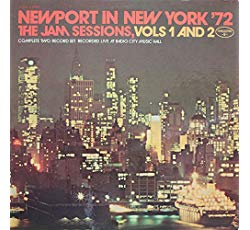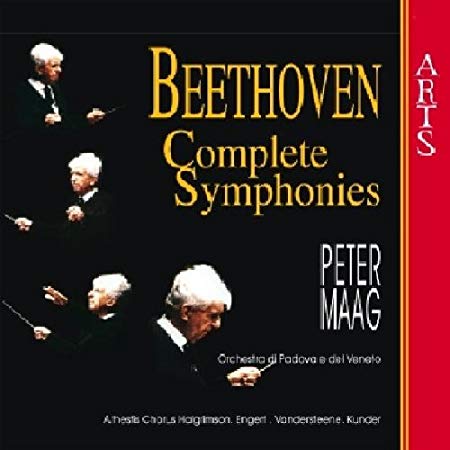-
Posts
13,205 -
Joined
-
Last visited
-
Donations
0.00 USD
Content Type
Profiles
Forums
Events
Blogs
Everything posted by Larry Kart
-
A friend of mine, himself a talented composer-arranger, thinks of Florence's writing as quintessentially "white." I think I know what he means, but my attitude is pretty much "so what?"/"different strokes." Also, while some might find Florence's writing a bit bland at times, it's not at all simple-minded IMO. I particularly like the way he writes for his trumpet sections (and he always has a section of topnotch executants) as though (or so it seems to me) they were playing saxophones. When I'm following one of Florence's fairly elaborate semi-soloistic brass or reeds ensemble passages, I'm never bored.
-

Controversial Food Opinions
Larry Kart replied to Dan Gould's topic in Miscellaneous - Non-Political
Especially on a hot dog. -
-
I listened to "Great Friends" again, this time back to front. Mix is still off in several weird ways I can't quite describe -- never heard so much variance before thataways on an album on a track to track basis, with all tracks seemingly from a single recording session -- but this time through the considerable virtues of the music are a good deal more apparent for me. Thanks for jogging my elbow.
-
Enjoyed both sides of Vol. 1 for sure, but didn't quite see how Buckner's work, enjoyable though it is, is also (as Jim seems to imply) that unusual or weird. Freewheelingly loose it is, if you will, especially in this jam session context, but all the other players seem to deal with it in a more or less unthreatened, swirl of a cape manner, the way a matador might deal with a rampaging bull. Of particular interest, I thought, was the way Roland Hanna (whose solos IIRC follows Buckner's on both tracks) seem to have imbibed some of Milt's freewheeling juice. Old warhorse? Hand me my cane and sllppers.
-
OK -- I need to listen again from this point on.
-
On my Evidence label version of this, on track 1 Reggie Workman is more prominent in the mix than than Billy Harper! Also the room in which the album was recorded seems fairly dead/claustrophobic. I've never lasted all the way through.
-
'On Miles's live "So What" video (1959), you can see Trane grabbing Frank Rehak's attention - a great moment.' I remember that.
-

What Classical Music Are You Listening To?
Larry Kart replied to StarThrower's topic in Classical Discussion
-

Jazz musicians that started their own labels.
Larry Kart replied to Hardbopjazz's topic in Miscellaneous Music
Vertigo is a most unfortunate condition; don't know about Embryo. Kokopelli can kill you. -
Yesterday I was listening only to the released takes. There are a number of alternates on disc 2 of the set I have; I'll check them out.
-
Depends. For me, hearing late '57 Trane is these different contexts was very worthwhile. A glorious musical artifact? Probably not. But It's a unexpected window on jazz history in motion.
-
"Monk's Music" was recorded in June '57; the Blakey/Coltrane Bethlehem material was recorded in December '57. Also, Coltrane already had moved a good ways along from how he sounded six months before -- at times fairly full-fledged "sheets of sound" passages are present.
-
For the first time in a long while I just listened to this material (side one of "The Bethlehem Years" compilation) and found it fascinating both for late '57 Coltrane himself and for the opportunity to hear him with players he wasn't usually (in some cases never) heard with otherwise. The tracks with Blakey (big band and small group) -- what a delight to hear Coltrane with Blakey boldly interacting beneath him. (Sound quality is good.)Also, that studio big band, contrary to what I'd been led to believe, was quite together for the most part, and trumpeters Ray Copeland and Idrees Sulieman play very well. What chops Copeland had and quite an imagination to boot. And Walter Bishop Jr. is in fine form. The "Wiinners Circle" session -- aside from Donald Byrd and Philly Joe -- finds Coltrane among players whom I don't believe, with the exception of Al Cohn (and Al is on baritone!) hadn't been in the studio or on the stand with him before: Frank Rehak, Gene Quill, Eddie Costa, Freddie Greene (!!!), and Oscar Pettiford. One can only imagine how their ears were hanging out at what they were hearing from Trane. Indeed, in case one loses track of this factor, which perhaps is easy to do, all this Bethlehem material reminds one how differently Coltrane was playing in late '57 from ANYONE else. One regrets that the Coltrane/Blakey pairing would never be heard again on disc (unless I'm forgetting something); they had a good deal to say to each other. While the Coltrane/Blakey combination was not utterly unlike what Coltrane and Elvin would become, Blakey definitely had a flavor all his own, and it was a flavor to Trane's taste, it would seem.
-
In his excellent Baker book, Jeroen de Valk says of "Leaving": "The best Chet Baker record you've never heard.... Never issued on CD!"
-

Lee Morgan Film
Larry Kart replied to danasgoodstuff's topic in Jazz In Print - Periodicals, Books, Newspapers, etc...
See Sorry -- To me your question suggested that you were unaware of this thread, where the film was extensively discussed. Now I see you were referring not to the film but to a magazine article. -

Lee Morgan Film
Larry Kart replied to danasgoodstuff's topic in Jazz In Print - Periodicals, Books, Newspapers, etc...
See -
Yes, the price of Steeplechase CDs often makes me hesitate. Wish that weren't so, but it happens.
-
Ronnie Cuber, Rich Perry, and Andy Fusco aren't the least bit retro. The ways they play now are a logical extension of the ways they've always played, and they're darn good ways IMO. Stephen Riley does tip his cap to the past to some degree, but in an interesting personal manner, again IMO. The other leaders, except for the two bassists (McClure and Richmond), I don't know.
-
Will do. Vol .1 & 2 are an LP twofer. A brief review I wrote in 1980: There could be no better proof of the importance of sound in jazz, the tone or timbre one gets out of an instrument, than the music of tenor saxophonist Arnett Cobb. A native of Houston and one of the great Southwestern tenormen, along with Buddy Tate, Ben Webster, the late Herschel Evans, and Illinois Jacquet (who preceded Cobb in the Lionel Hampton band), this sixty-two-year-old master has a sound that no recording studio is equipped to reproduce. It is, to begin with, simply huge, perhaps the darkest, most imposingly rich tenor saxophone tone of all. And what Cobb does with it--the range of chortles, whoops, cries, trills, swells, slurs, shouts, and just plain honks that he has at his command is such that he could say, with Walt Whitman, “I am vast, I contain multitudes.” Not that Cobb is limited merely to purveying that sound. He is, by any standards, a rhythmically agile, harmonically sophisticated player who shapes his melodic lines with surprising delicacy. But because the significance of sound per se is so often overlooked in jazz, as though it were a seasoning rather than an essential ingredient, it is his sound that I want to concentrate on for the time being. When a man has a tone like Cobb’s and can manipulate it so freely, he has at hand an almost literal musical language, a collection of timbres that each take on a specific emotional meaning. And that specificity of emotional tone-color--which any listener can hear, even if one doesn’t wish to analyze it--also ranges outward to affect every other aspect of the music: rhythm, harmony, melody, etc. For example during Cobb’s solo on “Just a Closer Walk With Thee,” he began a chorus with a seemingly simple two-note phrase, which might be rendered onomatopoetically as “Yah-duh.” Now I suppose you had to be there to hear what that “Yah-duh” did, but let me assure you that within its apparent simplicity there was more musical meaning than words could exhaust. Aside from the way he attacked the first note, creating a catapulting sense of swing, there was the way its relative density--its heavy, centered sound--contrasted with the grainier, more oblique tonal texture of the second note. The effect of this might be compared to a gymnast’s second, more easeful bounce on a trampoline. And listening to it one could feel a literal loosening in the knees, an invitation to enter a realm of sensuous physicality. The creation and control of such effects, in which the abstract and the emotional aspects of jazz become one thing, is what Cobb’s music is all about. And if the principles at work in that “Yah-duh,” which must have lasted no more than a second, are expanded to cover an entire performance, it is easy to imagine just how richly varied this master’s language can be.
-
Just ordered Cobblestone Newport In New York Jam Session Vol. 1 & 2.
-
I hear the Dexter semi-kinship in, as you put it, "cadences of speech," the way phrases get bitten off in a more or less hip manner. As for Buckner, whom I like a good deal, that would have had to be some roller rink.
-
Unusual for sure. I liked it a lot.
_forumlogo.png.a607ef20a6e0c299ab2aa6443aa1f32e.png)


